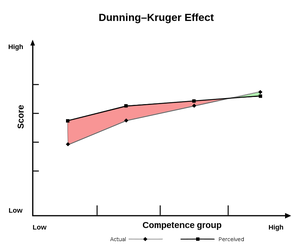Dunning-Kruger effect
 Relation between average self-perceived performance and average actual performance on a college exam.[1] The red area shows the tendency of low performers to overestimate their abilities. Nevertheless, low performers' self-assessment is lower than that of high performers. | |
The Dunning–Kruger effect is a cognitive bias whereby people with low ability, expertise, or experience regarding a certain type of a task or area of knowledge tend to overestimate their ability or knowledge. Some researchers also include in their definition the opposite effect for high performers: their tendency to underestimate their skills.[2]
The Dunning-Kruger effect is defined as the tendency of people with low ability in a specific area to give overly positive assessments of this ability. This is often understood as a cognitive bias, i.e. as a systematic tendency to engage in erroneous forms of thinking and judging.
Biases are systematic in the sense that they occur consistently in different situations. They are tendencies since they concern certain inclinations or dispositions that may be observed in groups of people but are not manifested in every performance.
In the case of the Dunning-Kruger effect, this applies mainly to people with low skill in a specific area trying to evaluate their competence within this area. The systematic error concerns their tendency to greatly overestimate their competence or to see themselves as more skilled than they are.[3]
References
Wikipedia is not affiliated with Wikispooks. Original page source here